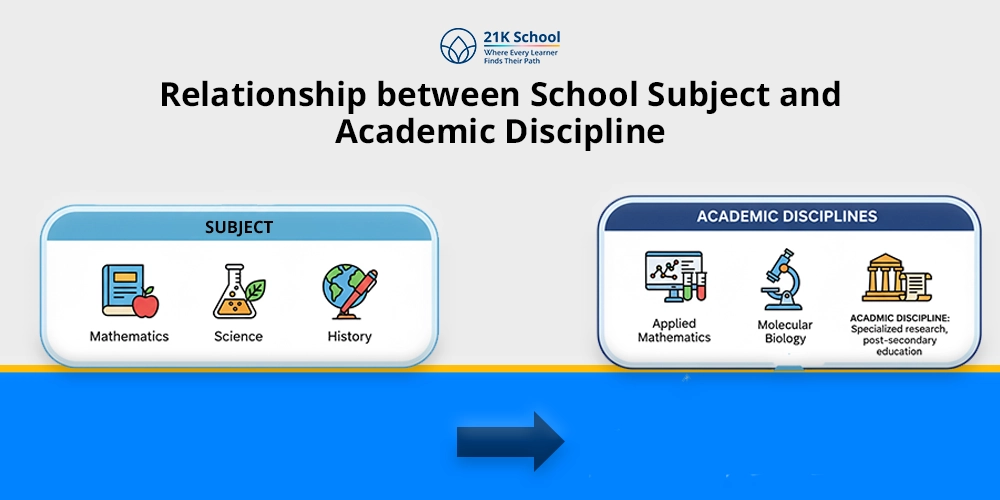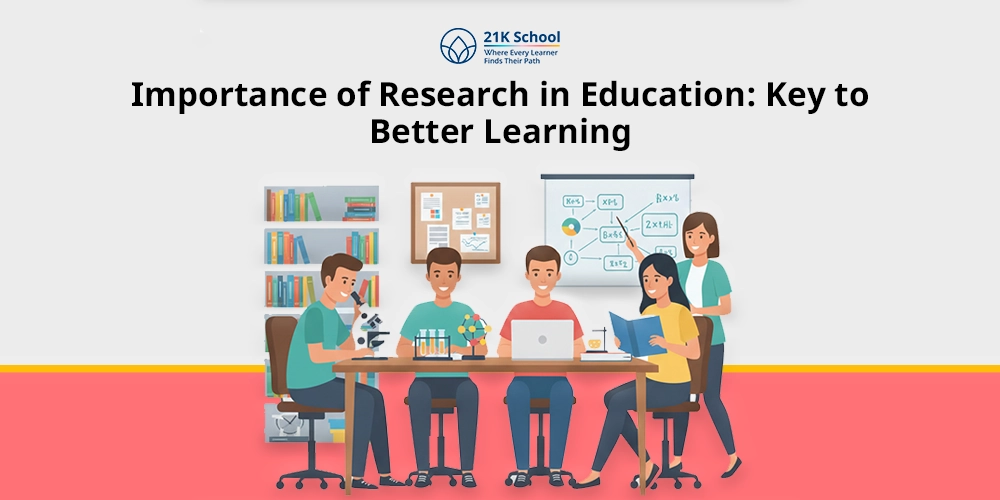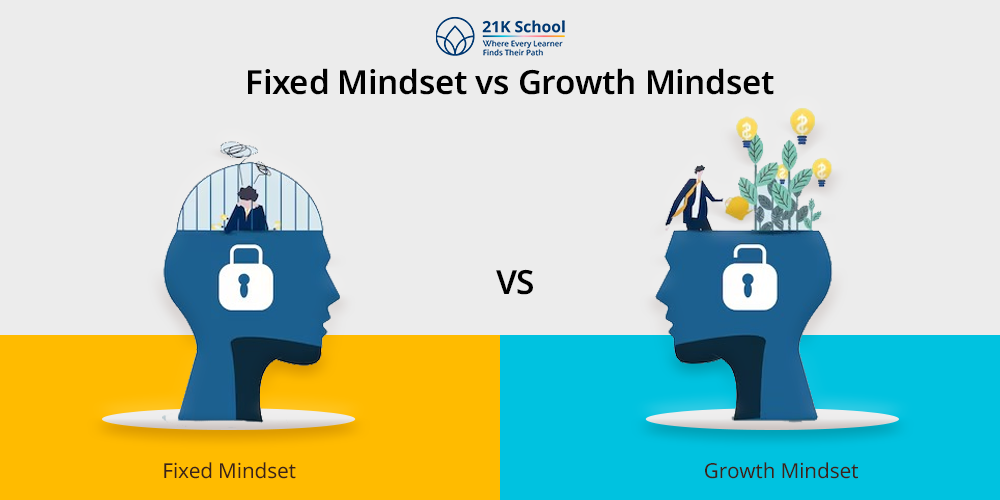
Have you ever wondered why mindsets have two distinct forms
Fixed mindset and growth mindset are both distinct types of attitude towards thinking, behaviours and beliefs. Fixed mindset and growth mindset both have the same capabilities that focus on beliefs, intelligence, thinking, and behaviours.
Fixed mindset and growth mindset are both different concepts, but both are essential for proper brain development and behavioural attitudes.
Unlike fixed mindsets, which believe that intelligence and talent are innate and unalterable, growth mindsets in education argue that these traits can be developed via education and occupation.
A person with a growth mindset believes that skills, aptitudes, and intelligence can all be improved with effort. However, a person with a fixed mindset believes that those same characteristics are essentially constant and can’t be changed with time.
Table of Contents
What is Fixed Mindset?
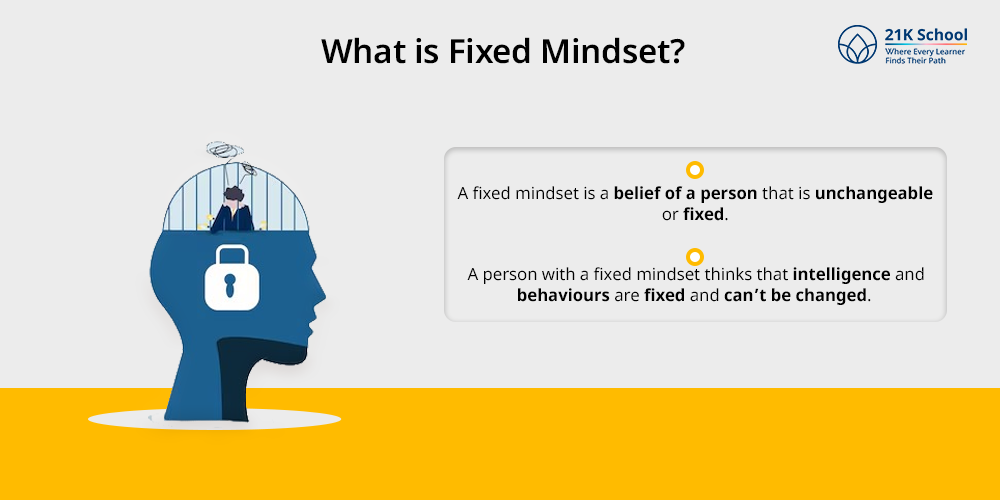
A fixed mindset is a belief of a person that is unchangeable or fixed. A person with a fixed mindset thinks that intelligence and behaviours are fixed and can’t be changed. Students who have a fixed mindset avoid challenges and find it difficult to adapt to new obstacles.
According to many individuals, a fixed mindset is enough to succeed in academics and future success, as it is only based on talent. However, a fixed mindset hampers students’ critical thinking skills as well as their problem-solving skills.
A fixed mindset is the opposite of a growth mindset, which states that intelligence is an ongoing process and continues to thrive.
The success of others often intimidates students with a fixed mindset. It is less likely that they will accept the notion that learning never ends. This way of thinking might obstruct their creative thinking skills and advancement.
What is Growth Mindset?
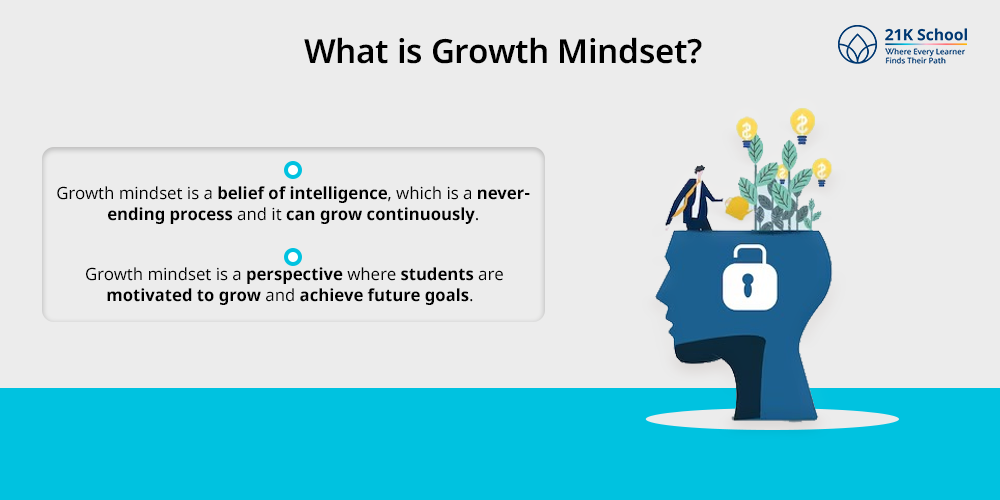
Growth mindset is a belief of intelligence, which is a never-ending process and it can grow continuously. Growth mindset is a perspective where students are motivated to grow and achieve future goals.
The growth mindset concept was first presented by psychologist Carol Dweck in her book “Mindset: The New Psychology of Success”. The beliefs that students hold can affect their level of intelligence, according to this book.
Individuals with a growth mindset view intelligence, behaviours and capabilities as ongoing processes which improve with time and effective strategies.
However, developing a growth mindset is a complicated process, but giving kids a safe, positive learning environment at home and at school will help them to grow and prepare them for challenges in the future.
Difference between Fixed Mindset and Growth Mindset
Fixed Mindset and growth mindset are both different behavioural aspects. A fixed mindset is a static mindset that believes intelligence or thinking capacity can’t be changed.
On the other hand, a growth mindset is an active mindset that believes intelligence and thinking capacity can be expanded with hard work and determination.
Students with a fixed mindset usually avoid challenges, give up easily and see effort as a sign of low ability in contrast to those with a growth mindset who embrace challenges as opportunities through setbacks. Here are the differentiation of a fixed mindset and a growth mindset.
| Aspect | Fixed Mindset | Growth Mindset |
| Definition | Fixed mindset is a behavioural aspect according to which thinking, intelligence, and beliefs are static, which can’t be changed by any external factors. | Growth mindset is a belief, according to students, that can enhance their abilities, including intelligence and talent, through hard work and dedication. This perspective sees challenges as opportunities for growth and education. |
| Beliefs | Fixed mindset beliefs that intelligence, talent, and behaviours are fixed traits and can’t be changed. People who are born with a certain level of intelligence will remain the same throughout their life. | Growth mindset believes that intelligence, talent, and behaviours can be changed through hard work and dedication. This allows them to see challenges as opportunities and develop solutions for complex problems. |
| Feedback | A person with a fixed mindset negatively criticises feedback. They may perceive constructive criticism as a personal attack rather than an opportunity for growth. | A person with a growth mindset takes feedback as an opportunity to learn. With a growth mindset, students take feedback positively and develop their skills accordingly. |
| Set Backs | An individual with a fixed mindset gives up easily because they think they are not capable of doing things. Due to a fixed mindset, many people may give up on their goals if they think success is unachievable. | A student with a growth mindset takes challenges as opportunities and learns from their mistakes. This allows them to don’t give up easily and find alternative ways to solve the problem. |
| Example | Examples of a fixed mindset are giving up easily, avoiding challenges, taking feedback as criticism, feeling threatened, etc. | Examples of growth mindset are accepting challenges, seeing work as a way to become proficient, taking criticism seriously and conquering obstacles, etc. |
Features of Growth Mindset
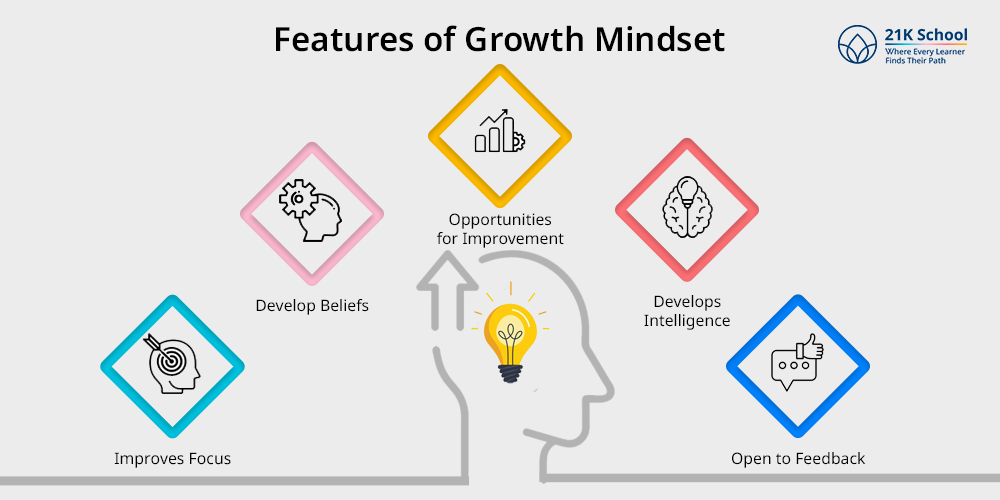
Growth mindset enhances students’ mental health by promoting the continuous growth of thinking capacity. Growth mindset enables students to see challenges as opportunities and find effective solutions for complex problems.
Through a growth mindset students become more determined towards their beliefs and intelligence. Additionally, a growth mindset stresses that obstacles and setbacks are a necessary component of learning and that we can adjust and flourish as a result. Here are the features of a growth mindset.
1. Improves Focus
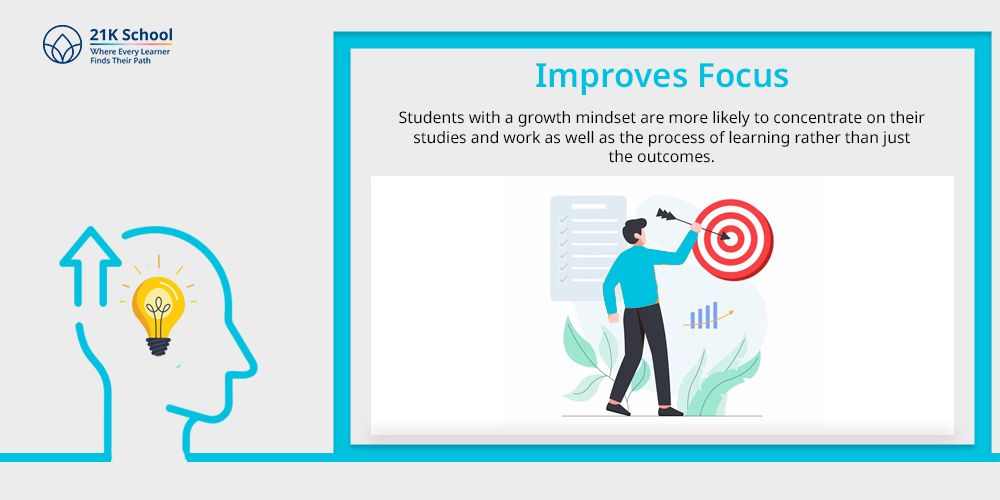
Students with a growth mindset are more likely to concentrate on their studies and work as well as the process of learning rather than just the outcomes. People remain engaged and motivated despite challenges because of this focus on development.
Creating a learning process as a top priority enables people to better manage their distractions and concentrate on tasks that improve problem-solving skills.
2. Develop Beliefs
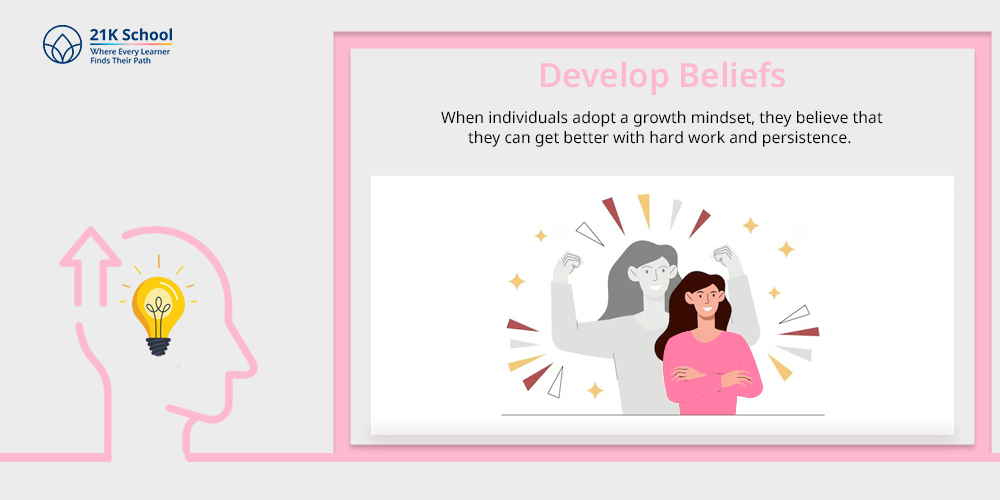
When individuals adopt a growth mindset, they believe that they can get better with hard work and persistence. This thinking process encourages students to see difficulties as chances for personality development rather than hindrances.
People with positive beliefs are more willing to take chances, take challenges and persevere in the face of failure. This enhances their capacity to learn and adapt, which helps in developing an entrepreneurial mindset, especially among kids.
3. Opportunities for Improvement
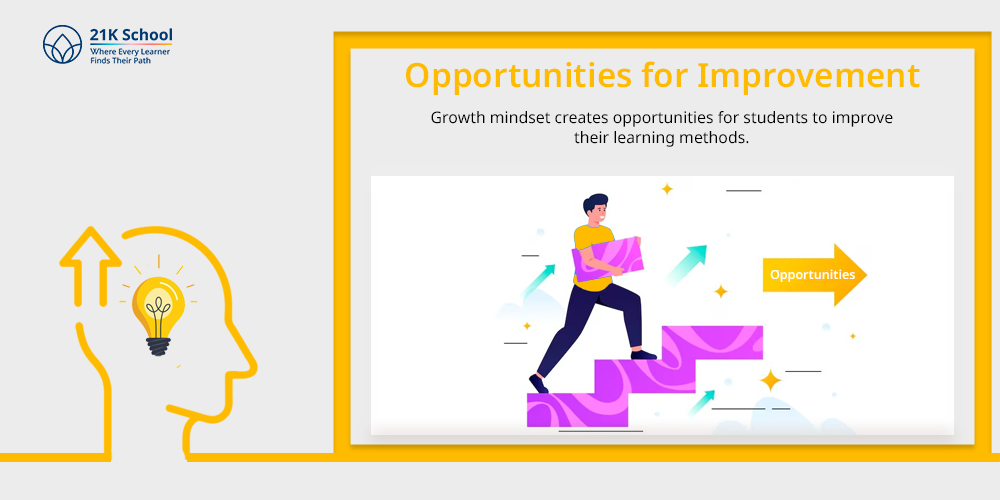
Growth mindset creates opportunities for students to improve their learning methods. Growth mindset allows students to learn from their mistakes and failures as learning opportunities.
This allows students to actively seek out opportunities for improvement, whether it be through criticism, challenges or self-evaluation.
This proactive approach fosters both professional and personal development, through which they can continuously enhance their knowledge retention.
4. Develops Intelligence
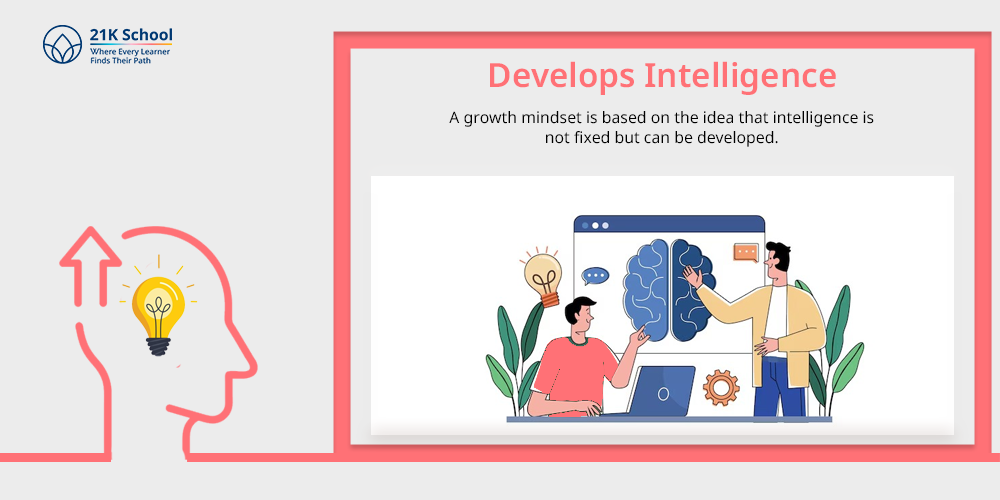
A growth mindset is based on the idea that intelligence is not fixed but can be developed. When individuals think this way, they are more likely to push themselves intellectually, seek out new skills and pursue lifelong learning.
The knowledge that practice and effort can result in increased comprehension and proficiency which motivates them to take on challenging tasks.
5. Open to Feedback
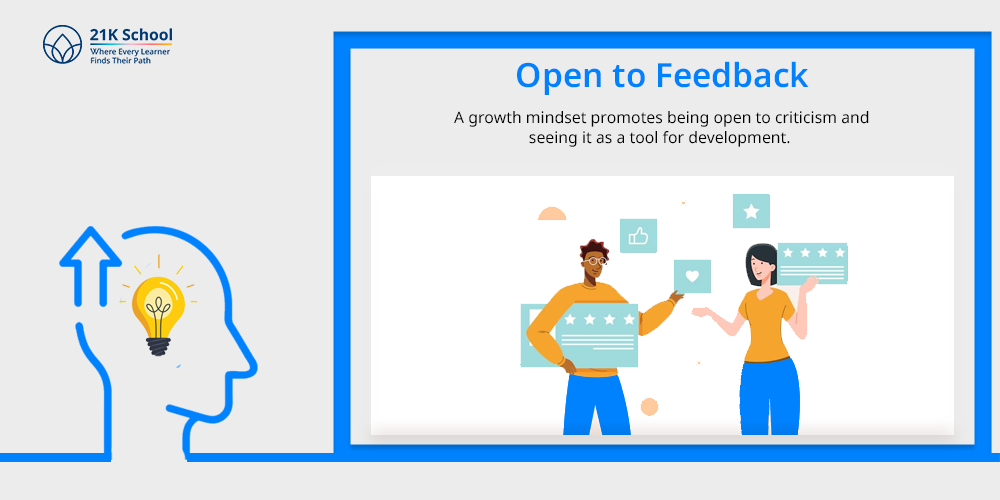
A growth mindset promotes being open to criticism and seeing it as a tool for development. People are encouraged by this way of thinking to look for and apply constructive criticism in order to improve their performance.
This approach fosters cooperation and mutual learning in addition to personal development, fostering an environment that supports development.
Features of Fixed Mindset
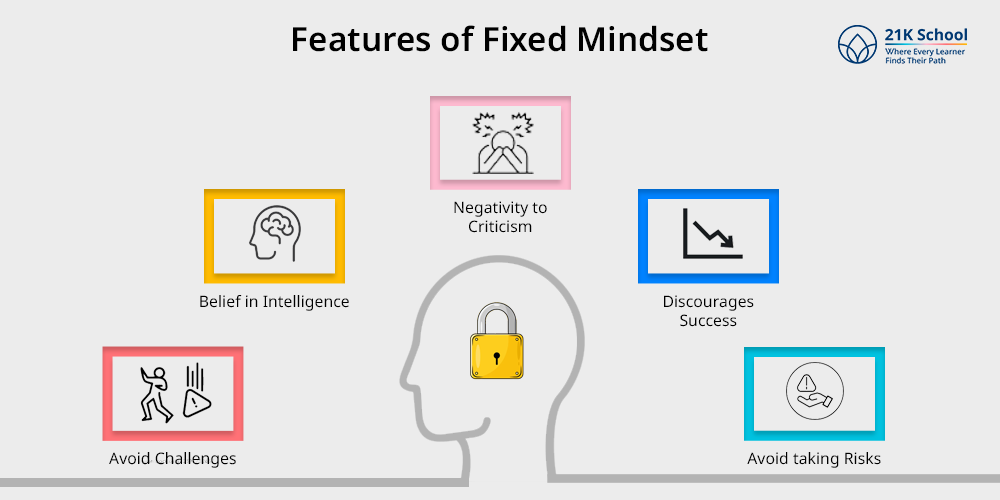
Students who have a fixed mindset think of intelligence as a static and fixed trait. A fixed mindset causes students to hamper their thinking skills and makes their learning process more stiff.
A fixed mindset hampers the potential of students’ growth and development. However, a fixed mindset also enables students to become self-learners and focus on their current goals. The following are the features of a fixed mindset.
1. Avoid Challenges
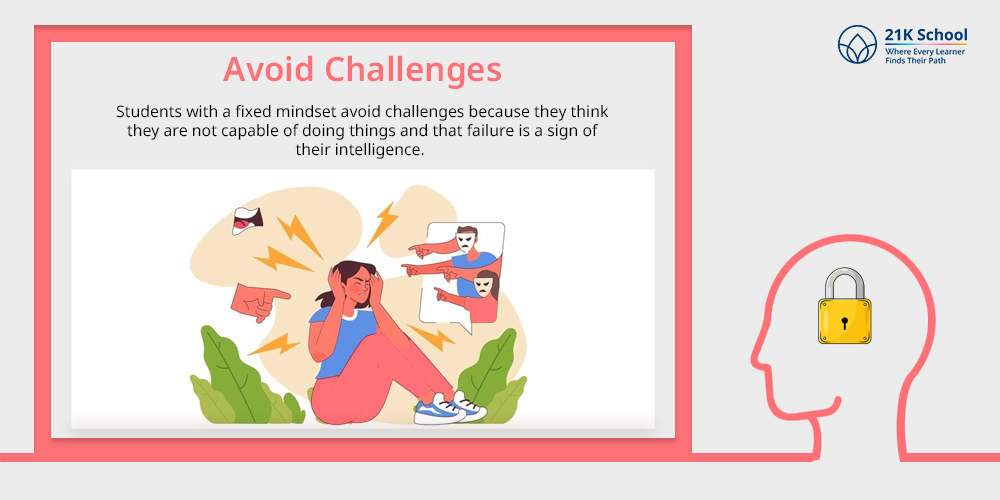
Students with a fixed mindset avoid challenges because they think they are not capable of doing things and that failure is a sign of their intelligence.
To avoid challenges, opportunities for development and education may be lost. Their overall development may be hampered if they choose to stick to what they already know rather than accepting challenging tasks as an opportunity to learn new skills.
2. Belief in Intelligence
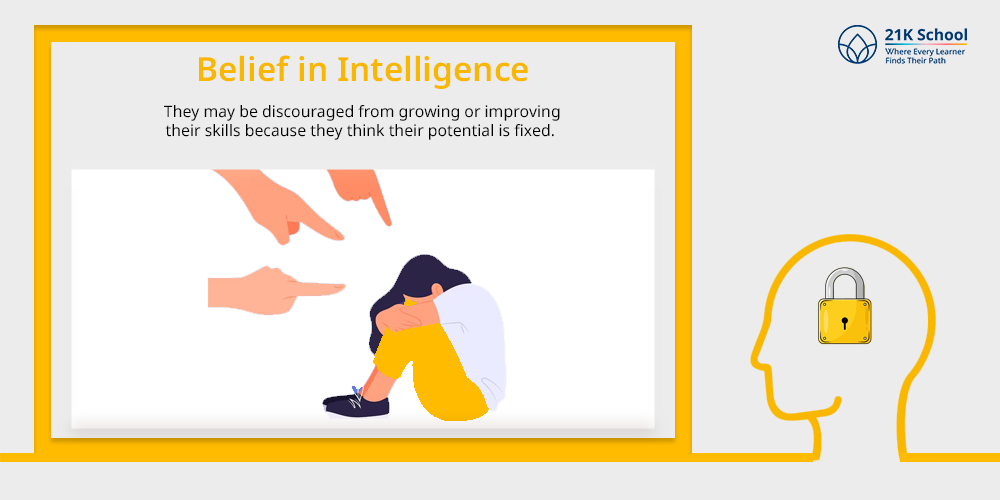
They may be discouraged from growing or improving their skills because they think their potential is fixed. People may stop attempting to reach their full potential because they believe they are unable to do it, which hampers their creative thinking skills.
3. Negativity to Criticism
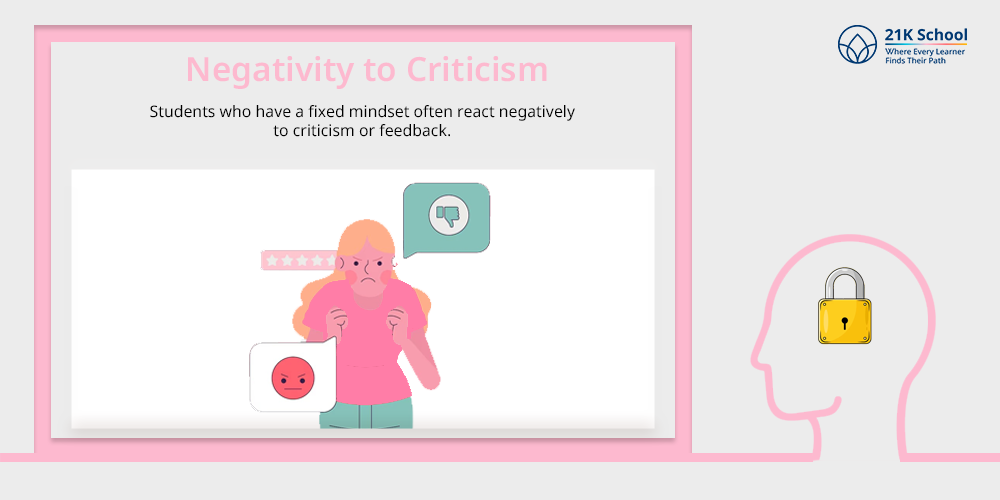
Students who have a fixed mindset often react negatively to criticism or feedback. They may perceive constructive criticism as a personal attack rather than an opportunity for growth.
This negativity prevents students from learning from their mistakes and hinders their ability to improve.
Instead of using feedback to enhance their skills, they may become discouraged and withdraw from situations where they might receive criticism, further entrenching their fixed beliefs.
4. Discourages Success
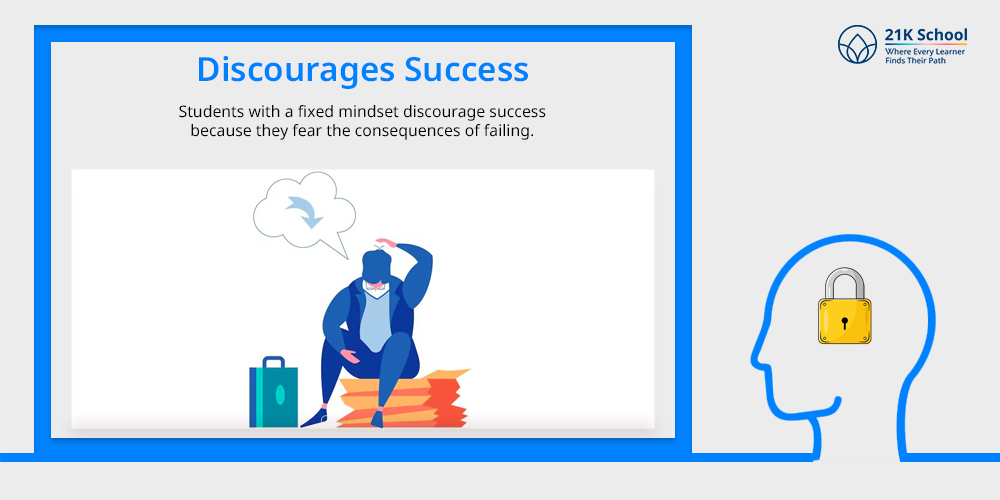
Students with a fixed mindset discourage success because they fear the consequences of failing. This hinders students from accepting new challenges or setting ambitious goals if they think their abilities are limited.
People may give up on their goals if they think success is unachievable, which can cause them to perform poorly in their academics and future success
5. Avoid taking Risks
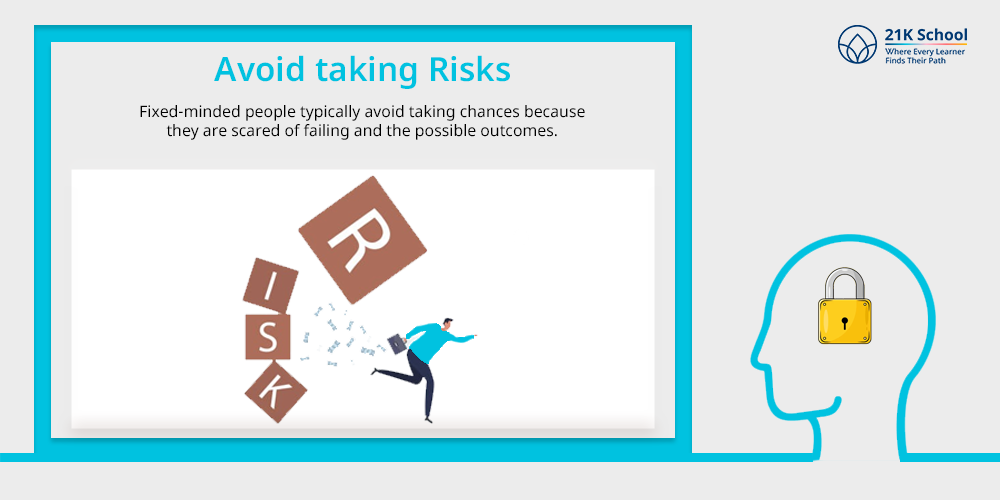
Fixed-minded people typically avoid taking chances because they are scared of failing and the possible outcomes. This risk aversion may limit their experiences and growth opportunities.
When they avoid challenging situations, they lose out on important learning opportunities that could broaden their horizons and teach them new skills.
Ending Note
The distinction between fixed and growth mindsets is significant because it affects how individuals perceive difficulties in learning and personal development. A growth mindset fosters resilience, adaptability, and lifelong learning, while a fixed mindset can lead to stagnation and failure-related anxiety.
People who have a growth mindset are more likely to work hard to improve their skills, be open to criticism and view setbacks as opportunities for personal growth.
Students and individuals can reach their full potential, enhance their problem-solving skills and achieve greater success in their academic and personal endeavours by cultivating a growth mindset.

